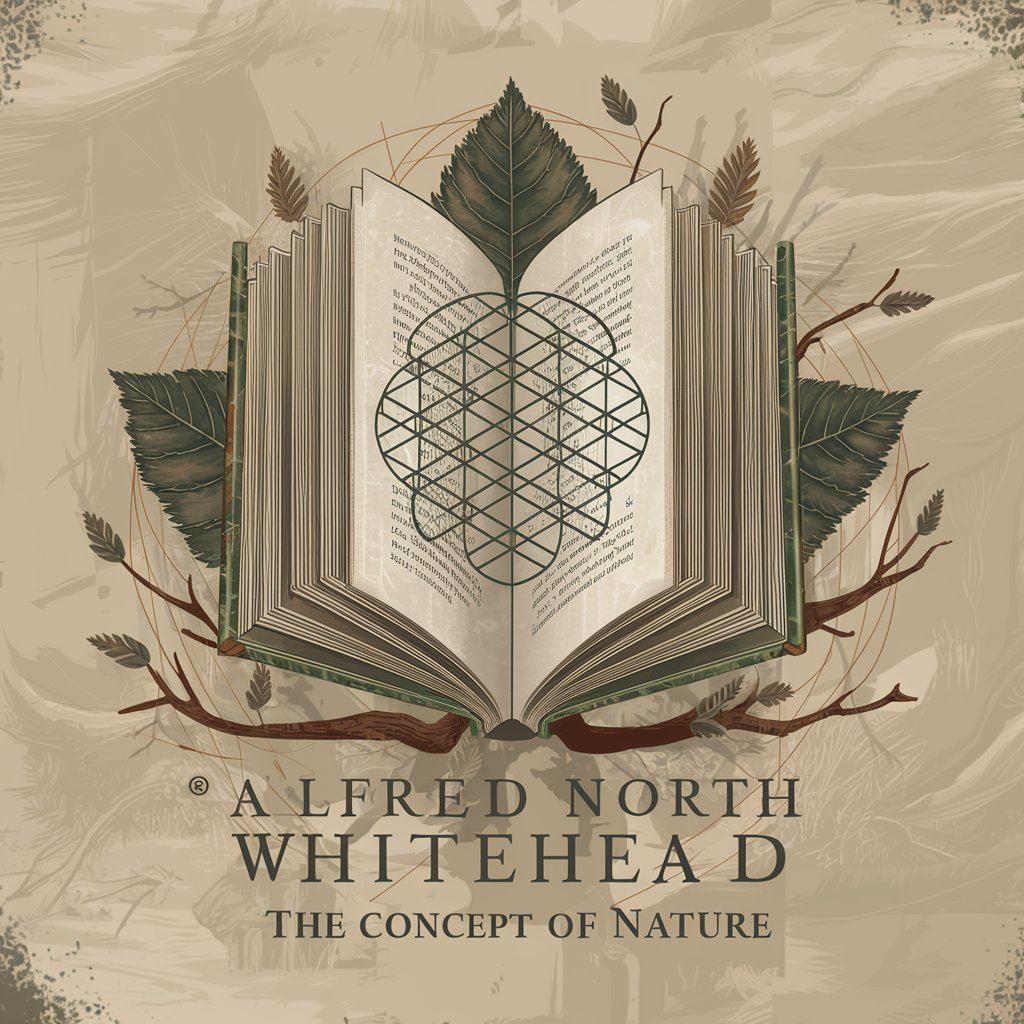Whitehead's Concept of Nature - Philosophical Inquiry Tool

Welcome to Whitehead's exploration of nature.
Exploring Nature Beyond Consciousness
In 'The Concept of Nature', Whitehead explores the relationship between...
Whitehead's critique of the bifurcation of nature argues that...
The concept of time in Whitehead's philosophy is crucial for understanding...
In discussing space and motion, Whitehead posits that...
Get Embed Code
Introduction to Whitehead's Concept of Nature
Alfred North Whitehead's 'The Concept of Nature' presents a foundational inquiry into the nature of reality, focusing on the phenomena we observe without the imposition of subjective interpretation. Whitehead distinguishes between 'nature' as the reality we perceive through our senses, and 'consciousness' or 'mind,' arguing for a form of realism where what is perceived does not necessitate an observing consciousness. This work is a precursor to his later, more complex philosophy of organism, laying the groundwork for understanding nature in its own terms, devoid of anthropocentric bias. Examples include the analysis of events and entities in nature, such as the movement of celestial bodies or the properties of light, approached without referring to human perception or consciousness. Powered by ChatGPT-4o。

Main Functions of Whitehead's Concept of Nature
Clarification of Nature's Independence
Example
Whitehead clarifies that nature is independent of the human mind by discussing phenomena like light's wave-particle duality, illustrating how nature's laws operate irrespective of human observation.
Scenario
In educational contexts, this function helps delineate the boundaries between subjective experience and the objective reality of natural phenomena.
Framework for Scientific Inquiry
Example
Provides a philosophical foundation for scientific inquiry that respects the autonomy of natural phenomena, such as using natural events' interconnectedness without superimposing external metaphysical concepts.
Scenario
Useful in scientific research to ground investigations in an ontology that acknowledges nature's own structure and processes.
Critique of Bifurcation of Nature
Example
Whitehead critiques the bifurcation of nature into subjective and objective realms by analyzing how this division undermines a coherent understanding of nature as it is.
Scenario
In philosophical debates, this critique offers a basis for arguing against dualistic approaches that separate physical reality from human perception.
Ideal Users of Whitehead's Concept of Nature Services
Philosophy and Science Educators
Educators can utilize Whitehead's framework to teach the philosophical underpinnings of natural sciences, emphasizing an understanding of nature that is independent of human observation and interpretation.
Researchers in Physics and Environmental Science
Researchers can apply Whitehead's concepts to explore the interconnectedness of natural phenomena without presupposing human perception as a necessary condition for their existence or behavior.
Philosophical Practitioners
Philosophers interested in the foundations of metaphysics and ontology can engage with Whitehead's work to challenge and refine contemporary understandings of reality, nature, and existence.

Using Whitehead's Concept of Nature
Start with a Free Trial
Begin by accessing a platform offering a free trial without the need for login or subscription, ensuring an easy start.
Understand the Basics
Familiarize yourself with Whitehead's definitions and distinctions in 'The Concept of Nature', focusing on his separation of nature from consciousness.
Identify Your Interest
Determine the aspect of Whitehead's philosophy you're most interested in, whether it's his views on space, time, or the abstraction process.
Apply to Your Field
Consider how Whitehead's ideas can be applied to your specific field of study or interest, such as physics, environmental science, or philosophy.
Engage with the Community
Join forums or discussion groups dedicated to Whitehead's philosophy to deepen your understanding and connect with others.
Try other advanced and practical GPTs
Tweet Segmenter
Segment Text Seamlessly with AI

Pro Fantasy Football AI Coach
Empowering Your Fantasy Football Decisions with AI

Structured Prompt Architect - GPT
Empowering Creativity with AI Intelligence

Epictetus GPT
Stoic wisdom at your fingertips.

Dil Ustası
Transform Turkish Text with AI

Halal Helper
Guiding your Halal journey with AI wisdom

Black Friday Sales Expert by Nara
Maximize Sales with AI-Powered Insights

Ebook Creator
Craft Your Story with AI

🦍
Empower Your Work with AI

Study Agent
Personalized Learning with AI

Design & Plan Architect
Architect your dreams with AI power

GeneaTree Builder/Faire Son Arbre Généalogique
Build Your Family Tree with AI

FAQs on Whitehead's Concept of Nature
What is the core idea of Whitehead's 'The Concept of Nature'?
Whitehead's core idea is the separation of nature from consciousness, focusing on how nature is perceived independently of human thought or feeling.
How does Whitehead define 'nature'?
Whitehead defines nature as the aspect of the world that is perceived through the senses, independent of consciousness and thought.
What is the significance of the 'method of extensive abstraction' in Whitehead's philosophy?
The method of extensive abstraction is crucial for understanding how Whitehead approaches the concepts of space and time, emphasizing how our understanding of these concepts is constructed from our perceptions.
How does Whitehead's concept of nature differ from traditional views?
Unlike traditional views that might intertwine nature with human perception or divine aspects, Whitehead strictly limits nature to what can be observed, excluding mind and consciousness.
Can Whitehead's philosophy be applied to modern scientific theories?
Yes, Whitehead's philosophy, particularly his abstract conceptualization of nature, can offer a foundational perspective in interpreting modern scientific theories, especially in physics and environmental sciences.
